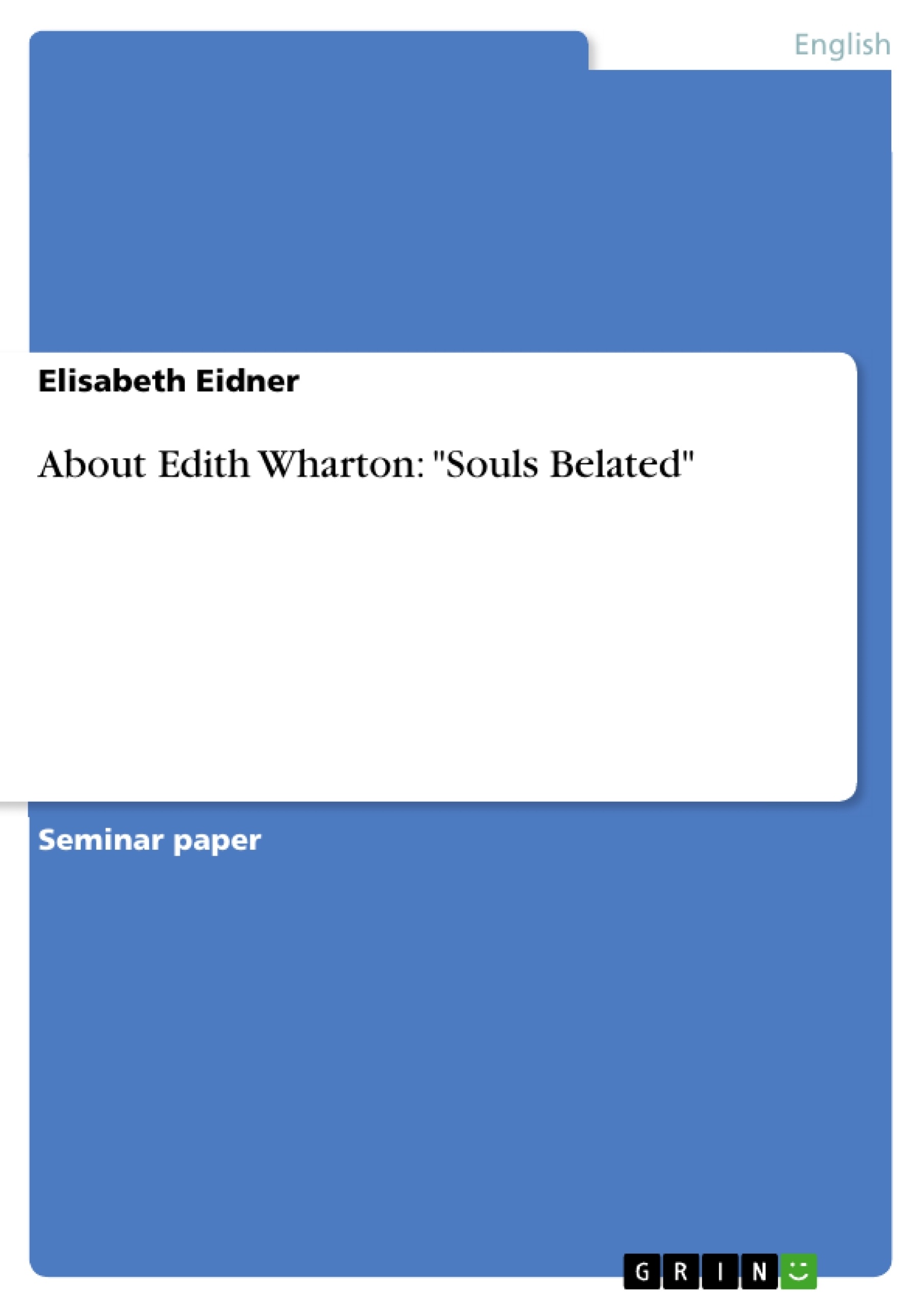enforcements and become an independent human being. In which way she tries to "free"
herself from the entrapment called marriage, which developments her way to her personal
liberty goes through and if she eventually succeeds will be discussed in this term paper.
In the first part of this term paper, I want to report briefly about the second half of the
nineteenth century in America and the role of women, especially female writers. Afterward
there will be a short look at the author's vita, because the way Wharton lived tells us much
about her understanding of different themes. Then I want to analyze Wharton's short story
'Souls Belated' which contains a lot of themes and symbols, from which the most interesting
will be described and interpreted. In a final conclusion I will try find an answer to the
essential topic of Wharton's story: Does the protagonist succeed in escaping the social
conventions due to her divorce or does she fail? And is it possible at all to "free" oneself of
the social imprisonment of the time described, particularly as a woman?
This term paper focuses on the thesis, that 'Souls Belated' is mirroring the social conditions
of Edith Wharton's 19th century New York Society and the institution of marriage as a kind of
cage for women.
Inhaltsverzeichnis (Table of Contents)
- Introduction
- 'The Gilded Age'
- 'True Womanhood'
- Late 19th century American Women Writers
- Edith Wharton
- 'Souls Belated'
- Formal analysis
- Settings, Plot, Persons
- Themes
- Conclusion
- Works Cited
Zielsetzung und Themenschwerpunkte (Objectives and Key Themes)
This term paper examines Edith Wharton's short story "Souls Belated" through the lens of 19th century American social conditions and the institution of marriage as a restrictive force for women. It aims to explore the protagonist's struggle to achieve independence and escape social constraints, particularly the limitations imposed by marriage.
- The role of women in 19th century American society
- The concept of "True Womanhood" and its limitations
- The restrictive nature of marriage for women in the late 19th century
- Themes of freedom, independence, and societal expectations
- The portrayal of social conventions and their impact on individual lives
Zusammenfassung der Kapitel (Chapter Summaries)
The introduction provides context by discussing the social and cultural landscape of the United States in the late 19th century, particularly focusing on the "Gilded Age" and its impact on women. It also introduces the concept of "True Womanhood" and its implications for the lives of women during this era.
The chapter on "Late 19th Century American Women Writers" explores the rise of female writers and their challenges in a society that often limited their opportunities. It discusses the impact of societal expectations and the pressures faced by women writers who sought to express themselves and gain recognition.
The chapter on Edith Wharton provides a brief overview of her life and work, emphasizing her perspective on the social constraints faced by women in her time. This chapter establishes a connection between her life experiences and her themes, which are explored further in "Souls Belated".
The chapter on "Souls Belated" delves into a formal analysis of the short story, examining its settings, plot, and characters. It also explores the major themes of the story, such as the protagonist's struggle for freedom, the constraints imposed by societal expectations, and the impact of marriage on women's lives.
Schlüsselwörter (Keywords)
This term paper focuses on key concepts such as "True Womanhood", the "Gilded Age", 19th century American society, social constraints, women's rights, marriage, freedom, independence, and societal expectations. It examines the impact of these concepts on Edith Wharton's "Souls Belated" and the protagonist's struggle for individual agency within a restrictive social framework.
- Citar trabajo
- Elisabeth Eidner (Autor), 2011, About Edith Wharton: "Souls Belated", Múnich, GRIN Verlag, https://www.grin.com/document/181565



